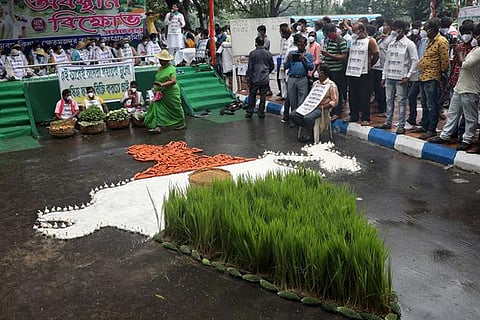

Chennai
Some of these such as the assurance that States are free to register private mandis, levy cess, and register all traders – which together are aimed at ensuring parity in transactions within and without the mandis of the Agricultural Produce Market Committee (APMC) – constitute a rollback of sorts.
The Centre has also promised to provide written assurances that the Market Support Price (MSP) scheme will continue in an attempt to ally apprehensions that one of the hidden purposes of the reforms was to end the insurance agriculturists have against a fall in the price of produce. The Centre has travelled a fair distance to allay apprehensions, but it has come much too late.
The protests now have gathered a head of steam, strengthened the sense of mistrust, and, not surprisingly, has found Opposition parties flocking in support for reasons ranging from sympathetic to expedient.
The Centre also badly miscalculated in failing to gauge the extent of anger invoked by the bills – particularly the Farmers’ Produce Trade and Commerce (Promotion and Facilitation) Act, 2020, which is perceived as undermining the entrenched mandi system, by permitting trade of agricultural produce outside of them. It should have also taken greater heed of the view that radical agricultural reform is better initiated by States, not only on account of the country’s federal structure but because of the political sensitivities that prevail in a sector that has been subsidised and protected for decades. It is another issue that such subsidy and protection has resulted in also harming the sector while furthering the cause of entrenched interests.
If Punjab and Haryana are at the forefront of the unrest, it is because they are agricultural states with entrenched mandi systems, its established middlemen, and extensive MSP procurement of wheat (70 per cent) and paddy (88 per cent). But the issue has acquired a national dimension with parties all over the country lining up to oppose the bills. The BJP is virtually isolated now and needs to find a way out of this mess of its making.
There is no reason why badly needed reforms in the agricultural sector should fail because of the atypical situation prevailing in two States. The Centre needs to find a way of pressing ahead with agricultural reforms and if this means deferring making some changes in Punjab and Haryana, so be it. That almost 50 per cent of the country’s workforce is engaged in producing much less than 20 per cent of its GDP is the most telling statistic about the sorry mess that the agricultural sector is in. There are other reforms such as ending or at least radically reforming, the urea subsidy regime, that need to be pushed through.
The last thing such reforms need is a climate of hostility and suspicion, which is what the farm bills have stirred up.
Visit news.dtnext.in to explore our interactive epaper!
Download the DT Next app for more exciting features!
Click here for iOS
Click here for Android